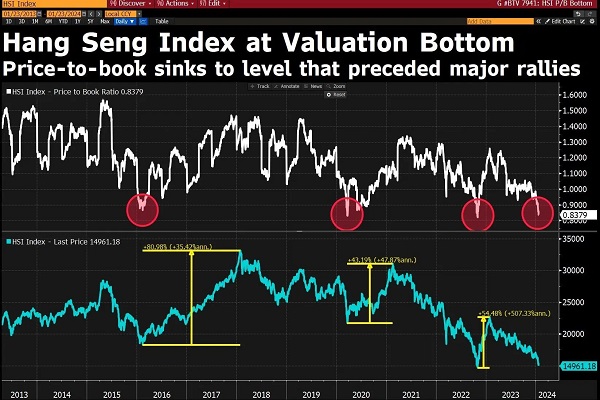When the Hang Seng’s valuation falls this low, it usually triggers a rally
Hong Kong is the world's worst-performing major stock market over the past year, and while the economic outlook for China is pretty miserable, deep pessimism can often spell high opportunity for investors.
2nd February 2024 09:50
by Stéphane Renevier from Finimize

I’m not going to sugarcoat it: the outlook’s grim for the Chinese economy, the price momentum’s atrocious, and you could be forgiven for wondering why anyone in their right mind would own Chinese stocks when they could own the high-flying Magnificent Seven instead.
But take it from those who invested in stocks during the darkest days of the global financial crisis: deep pessimism can spell high opportunity. Or as Warren Buffett would remind you: it’s often profitable to be greedy when others are fearful (and, yes, fearful when others are greedy).
That’s because, in the short term, investing is often like a beauty contest – with prices driven more by narratives and investor emotion than by good old-fashioned fundamentals. And because of that, prices tend to overshoot their fundamentals – and more higher or lower. But at some point, prices reach an extreme, and when there’s no one left to get on board, those prices start to revert.
And we may be reaching that kind of inflection point for Hong Kong stocks, with investors’ extreme bearishness plunging valuations to levels that historically have preceded big price rallies.
Now, I’m personally not a big fan of using valuations to predict short-term returns – prices can continue to deviate from their fundamentals for a long while.
But, if you’re talking about long-term returns, valuations are one of the most important drivers – if not the most important one. And right now, the valuations on Chinese stocks (particularly Hong Kong ones) are too cheap to ignore. They’re at record lows not just versus their own history but also relative to stocks from other markets, and that makes the risk-reward pretty appealing for long-term investors.
For one thing, the situation would need to get a whole lot worse over the next ten years – or stay as bad for a whole lot longer – for valuations to end up lower than they are today. So there’s a significant margin of safety right now.
For another, a rebound in valuations – even just to more normal levels – would be enough to generate some attractive returns, even if these companies’ earnings don’t exactly rock the house. Historically, the best returns achieved over a decade have happened when starting valuations were low, and the profit outlook grim.
Now, I’m not suggesting Chinese stocks will perform as well over the next decade as US stocks did over the previous one. And I’m not suggesting they’re crash-proof in the short term (they’re certainly not). But if you’re willing to wait it out for ten years, the potential benefits – enhanced returns and geographical risk diversification – could make these stocks worth your while. And don’t worry if some people think your bet looks foolish – the best value plays tend to look that way at first.
Stéphane Renevier is a global markets analyst at finimize.
ii and finimize are both part of abrdn.
finimize is a newsletter, app and community providing investing insights for individual investors.
abrdn is a global investment company that helps customers plan, save and invest for their future.
These articles are provided for information purposes only. Occasionally, an opinion about whether to buy or sell a specific investment may be provided by third parties. The content is not intended to be a personal recommendation to buy or sell any financial instrument or product, or to adopt any investment strategy as it is not provided based on an assessment of your investing knowledge and experience, your financial situation or your investment objectives. The value of your investments, and the income derived from them, may go down as well as up. You may not get back all the money that you invest. The investments referred to in this article may not be suitable for all investors, and if in doubt, an investor should seek advice from a qualified investment adviser.
Full performance can be found on the company or index summary page on the interactive investor website. Simply click on the company's or index name highlighted in the article.